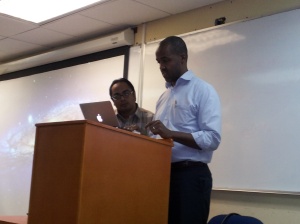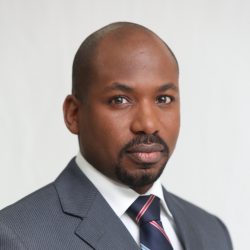
A mobile SMS-based survey service from a Caribbean-based company could change the way data is collected and analysed in the region.
If Kenfield Griffith has anything to say about it, his company will soon be adding potent fuel to the digital revolution smouldering quietly throughout the islands of the Caribbean.
Born in Montserrat and of Barbadian extract, Griffith is the CEO of mSurvey, a mobile surveys company based in Kenya. Kristal Peters, Director of Business Development and Strategy, runs the company’s Trinidad and Tobago office.
“It’s Friday morning. Let’s create a survey together,” Griffith says to a group of relative strangers gathered in a small room in the Max Richards Building at the Faculty of Engineering of The University of the West Indies, St Augustine for mSurvey’s workshop on data collection and surveying using mobile technology.
His confidence seems well placed. Within minutes, the demo survey is set up and sent to a pool of prospective participants located in Kenya and Trinidad and Tobago, who immediately start returning their responses via SMS technology. Soon, their data start streaming in to a dynamic web page, which aggregates and visualises the survey results in real-time. In no time at all, the roomful of workshop participants, about fifty in all, are analysing the fresh data.
The audience is an interesting mix of academics, researchers, policy makers, mobile carrier representatives, students and software developers, and many seem eager to learn more.
“Do you sell data to third parties?” asks one man seated toward the middle of the room.
“We have the technology that folks use to get other people’s data. But we don’t sell anyone’s data to third parties,” Griffith replied.
Moments later, he clarified his business model. The primary service that mSurvey provides is to help people, businesses and organisations to use mobile technology to get the precise data they need to make high-impact decisions quickly.
“We’re trying to solve a problem here and that problem is getting data.”
To have some idea of what Griffith means, you need only to have tried to get survey data quickly and reliably in the Caribbean context. For many organisations trying to use survey data to harvest meaningful insights and increase their ROI, the biggest stumbling block is the inability to gather data in the first place. Door-to-door surveys are costly and painfully slow. Open data sources like the World Bank are always just a click away but don’t necessarily give the specific insights required for contextual decision-making. And commissioned online surveys are challenged by the limits of the local population’s access and connectivity to the Internet. By some estimates, residential broadband Internet penetration in Trinidad and Tobago, for example, remains as low as 45%.
“Getting information in emerging markets is a pain point for most of us,” Griffith said.
But for every problem, a solution. Mobile penetration in Caribbean islands like Trinidad and Tobago can be as high as 140%. Everyone, statistically speaking, has a phone…or two. So the mSurvey platform allows the entire survey process to be completed over a regular mobile SMS plan at no cost to participants. Respondents don’t need mobile or Wi-Fi broadband Internet connection, nor even a smartphone.
For mSurvey, the ubiquity of the mobile phone has become the answer to one of the region’s biggest obstacles to data collection.

